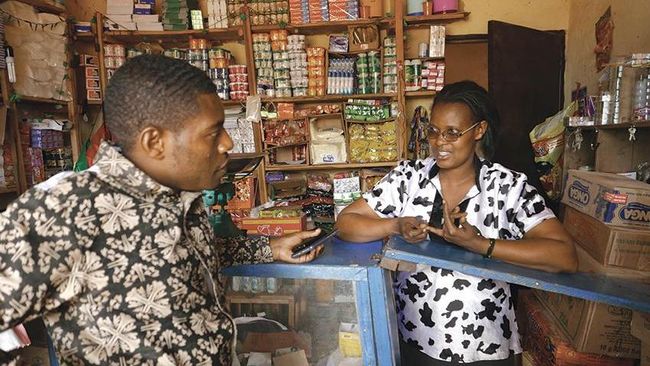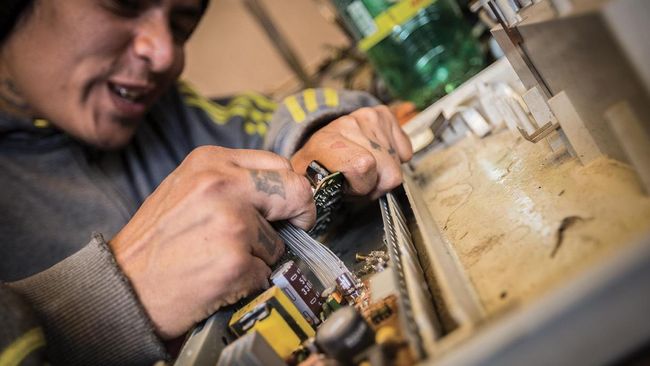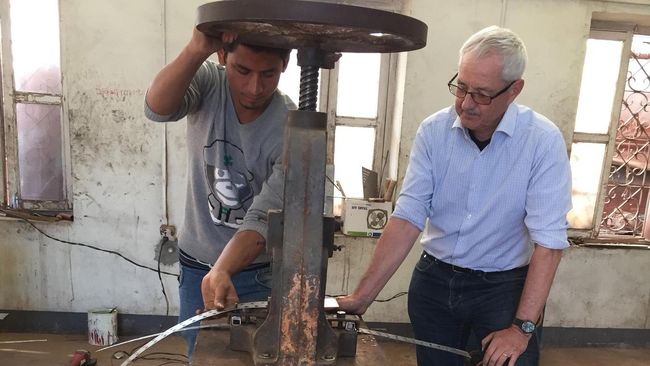![[Translate to Englisch:] Qualitätskontrolle im Textilsektor in Bangladesch [Translate to Englisch:] Qualitätskontrolle im Textilsektor in Bangladesch](../fileadmin/_processed_/3/b/csm_Trends_1_cf5c6db35e.jpg)
Swisscontact’s country portfolio includes both very poor and fragile countries, as well as middle-income countries. In both contexts, Swisscontact was able to offer specific solutions and broaden its project portfolio in 2016, thanks to many years of experience. Swisscontact also has broad knowledge of collaboration with private sector companies – an objective of the UN’s Sustainable Development Goals (SDGs).
Swisscontact works in various countries where the state stands on shaky ground.
Political or humanitarian crises render the creation of functional state institutions difficult. In North and West Africa, there is also the threat of violent extremists and terrorist outfits. Such fragile contexts present challenges to Swisscontact; the risks to project management, safety, and achieving our goals are more than in well-functioning states. Wherever state structures are weak, it is a particularly challenging to induce sustainable systemic change.
Of course, these challenges are not new. Over the last few decades, Swisscontact has learned how to make its mark fighting poverty even in fragile contexts. Key is the ability to react quickly and have well-established control mechanisms in place within projects. However, along with more stringent safety requirements, these involve higher operational costs and careful use of financial resources to cover these costs – with ever-tighter project budgets expected in the future.
In fragile contexts, Swisscontact is almost exclusively implementing technical projects financed by bilateral donor organisations such as the Swiss Agency for Development and Cooperation (SDC) or private sector partners. The main focus of these types of projects is in Africa.
In poor countries, Swisscontact’s work focuses mostly on the bottom of the pyramid of society. In middle-income countries, the focus is on involving those who otherwise do not benefit from general economic growth. Even though there is a growing middle class in these countries, income distribution is very uneven; poverty and hopelessness are still endemic.
The fact that Swisscontact’s private sector development know-how in middle-income countries is recognised, is supported by the increased collaboration with the State Secretariat for Economic Affairs (SECO). Swisscontact is implementing several large-scale projects that sometimes span multiple continents, including the Swiss Entrepreneurship Programme in six countries, and the Swiss Import Promotion Programme (SIPPO) in eleven countries (as of 2017). There is also a project helping to improve the competitiveness of Colombian SMEs.
Middle-income countries often boast relatively stable governments and economies. This makes it easier to collaborate with private sector companies as outlined in the UN’s Sustainable Development Goals (SDGs): the private sector should play a key role in achieving sustainable development goals.
For Swisscontact, involving the private sector in development projects is a regular practice. For years now, we have been collaborating closely with private sector partners within our market development projects; these partners also contribute to project costs. Thus, for the Katalyst Project in Bangladesh, where public donors have invested over $100 million over 10 years, the private sector has provided $50 million in investment. One model that has already become established is the public-private partnership, based on matching funds. This means that the public sector supports the efforts of private companies to contribute to the SDGs by taking on a portion of the investments and thereby buying down some of the risk.
As a foundation with close ties to the business world, Swisscontact welcomes closer collaboration with the private sector. Swisscontact however sees a challenge in complementing private investments, not stifling them. The distribution of roles needs to be defined even more sharply: what are the roles of the private sector, the multilateral and institutional donors, and what can development NGOs like Swisscontact do? An example of how these roles could be allocated is provided by a Swisscontact project in the Indonesian cocoa sector financed by SECO: the public sector finances classic development policy objectives such as basic training or initiatives to improve gender equality. For its part, the private sector covers the costs of sustainability certification, traceability and monitoring. Swisscontact coordinates these efforts as a neutral arbiter.
For its development programme, Swisscontact implements its own projects supported by SDC and private sector partners. In the latest 2017 – 2020 phase, existing projects will be further developed so that they can achieve long-lasting impact. The programme will be expanded to Cambodia, by extending the project to promote tourism in southern Laos and by introducing new agricultural technologies. The thematic focus in the new phase is also on vocational education. The subject of entrepreneurship is being given more importance in that new approaches are being tested and innovative young adults are supported in their efforts to launch their own business concepts.
In terms of subject matter, Swisscontact has worked intensively with financial services during the reporting year. Access to financial services provides a basis for participating in economic life, and an economy can only become formalised and strengthened if local businesses are integrated into the financial sector. Based on various internal studies and discussions, a new strategy regarding this issue has come about. It stipulates that there should be access to financial services in all new Swisscontact projects: if Swisscontact is to introduce a new teaching curriculum in skills development projects, then this should include teaching basic financial skills. In value chain development programmes, it is also essential for smallholder farmers to be able to open savings accounts or access credit. Only this way will they be able to invest in their enterprise.
Swiss expertise is highly valued in Swisscontact’s projects. Access is provided through our close collaboration with Swiss research institutes. In 2016, for example, experts from the University of Applied Sciences St. Gallen (FHS) and the Swiss Hotel Management Academy in Lucerne (SHL) shared their expertise with tourism firms in Macedonia. Based on solid collaboration with various institutes at the Lucerne University of Applied Sciences and Arts, a global and comprehensive agreement has been signed. Furthermore, during the reporting year, Swisscontact has worked closely with the Zurich University of the Arts as well as the Zurich University of Applied Sciences in Wädenswil.
Swisscontact is now working in 34 countries. In 2016, we opened an office in the Democratic Republic of Congo. Map

Myanmar is at a critical period of transition. The country appears ready to open up. Its outlook is good as it has immense economic potential. Growth in the tourism sector is particularly brisk. However, the country lacks trained professionals to sustain its economic growth. Vocational education in Myanmar had been neglected for decades. Through the Vocational Skills Development Programme (VSDP) financed by SDC, Swisscontact is helping to bridge this gap.
Myanmar is at a critical period of transition. The country appears ready to open up. Its outlook is good as it has immense economic potential. Growth in the tourism sector is particularly brisk. However, the country lacks trained professionals to sustain its economic growth. Vocational education in Myanmar had been neglected for decades. Through the Vocational Skills Development Programme (VSDP) financed by SDC, Swisscontact is helping to bridge this gap.The organisation is providing training, and fostering the employability of men and women such as Kyaw Kyaw Moe. Although this young man completed school, he could not afford further training. He switched from one odd job to the next. He had neither a regular income, nor any future prospects.
Kyaw Kyaw Moe heard about of the ‘Hotel Training Initiative’, a component of Swisscontact’s VSDP in Myanmar. He enrolled in a seven-week hospitality training course in Yangon. “I believe I’m a good communicator and therefore I’d be good as a waiter”, says Kyaw Kyaw Moe.The short courses combine theory and practice and for the past two years they have been held in Yangon and Nay Pyi Taw at hotels with which Swisscontact collaborates closely. Trainees can apply their newly acquired skills immediately on the job. In return, hotel managers can also have their own supervisors and line staff trained. Hotels are therefore used as training venues, which provide the perfect setting for the trainees to observe and apply their knowledge and skills in real-life situations with customers.A selected team of Master Instructors, previously trained by a Swiss hotel management school for nearly a year, trains supervisory level staff in order to become instructors. Subsequently, these instructors are in charge of training disadvantaged people and line staff together. Through the tireless efforts of the Swisscontact team and strong cooperation with partner hotels, the Ministry of Hotels and Tourism and community-based organisations, Myanmar’s tourism industry has gained 2,355 new people trained in hospitality and nearly 300 instructors within a span of just two years.After completing Swisscontact’s course, Kyaw Kyaw Moe worked in banquet halls at various hotels. This allowed him to gain more professional experience. After three months, he found a full-time job at Silver Green Hotel in Yangon. Shortly thereafter, he was promoted to Food and Beverage Supervisor. With a secure source of income and regular employment his outlook also improved: “My dream is one day to become a Food and Beverage Manager”.
Video: HTI - A Quest for Training Myanmar People in Hospitality

Suzana Dimitrievska has been cultivating
organic products on her farm in Mustafino, Macedonia for more than 10 years. She is a pioneer in organic farming in Macedonia. Her path has not been easy. Growing up in the countryside, she paid to educate herself in organic farming techniques. At the same time, with her dedication she has made significant efforts to advance the organic sector in Mace-
donia.
Suzana believes that people must find a way to grow food sustainably. Organic farming
rises to this challenge. “Initially I sold my organic produce at the same price as conventional produce. The organic market in Macedonia didn’t even exist yet. Nobody wanted to pay more just because I grew products organically. However, I didn’t give up. I knew that my future was in organic farming,” says Suzana.
Swisscontact helped Suzana find high-quality seeds and import them to Macedonia. It also provided valuable advice and expertise for
organic food production, irrigation, and crop protection. With Swisscontact’s assistance, she also went to the world’s largest trade fair for organic food, where she met buyers and suppliers.
In 2016, she planted three hectares of organic beans from high quality seeds imported from the Swiss company Sativa. Suzana’s beans meet Swiss quality standards and will soon end up on Swiss supermarket shelves. “Swisscontact helped me export my first shipment of beans to Switzerland. If all goes as planned, I will be planting beans on at least 20 hectares in 2017”, explains Suzana.
Suzana heads a local cooperative, helping nine other farmers with her knowledge and network. The cooperative plans to continue expanding organic production in the region and work with more farmers, employing more people on their farms. International buyers are also interested.

Businesswomen in East Africa face particular challenges that differ from those faced by their male counterparts. They do not enjoy the same security, because it is usually the husband who manages the family finances. This makes it difficult for women to receive a loan from the bank. Without credit, they are unable to expand their enterprise and grow to their full business potential.
Together with Equity Bank – one of the largest banks in East Africa – Swisscontact has developed special credit facilities for businesswomen in Rwanda and Tanzania. Conditions such as repayment terms or required collateral are tailored to the women’s abilities.
Training expands the loan products Equity Bank can offer, and helps women improve their business skills. For example, they learn how to plan their own budgets and conduct basic bookkeeping. Swisscontact has trained bank employees on how to conduct this training themselves. They have since become an integral component of Equity Bank’s credit mechanism. These training programmes will continue even after the project concludes.
Valentine Uwimbabazi runs a small bakery in western Rwanda. Before the business training conducted by Equity Bank, she had never kept any business documentation. “Now I am able to track the stock of everything from raw ingredients right up to the sale of finished goods. I keep solid accounts in one ledger,” says Valentine. Now she has a good overview of expenses and revenue and is able to plan for the long-term and might soon purchase a larger oven for her business.
Swisscontact is tackling another impediment that businesswomen face: they usually lack good networks. A business club for women that Swisscontact helped establish makes it possible for businesswomen to connect above and beyond the training, discussing and benefiting from their mutual experiences.

Waste dumps in Bolivia are overflowing. Everything winds up in them, from kitchen waste to discarded household items all the way to e-waste. Poisonous materials contained in rubbish are harmful to the environment and human health. Swisscontact is working together with the government to improve waste management, serving as a resource to the authorities in drafting a new law. Furthermore, Swisscontact is helping entrepreneurs such as Jonnathan Butron Claure to take advantage of the economic potential offered by recyclable waste.
Assisted by Swisscontact, the environmental inspector Jonnathan founded REEcicla in 2012. It was the first company in Bolivia for the proper disposal of e-waste. Jonnathan’s employees take old electrical appliances for a small disposal fee. Next, they dissemble them into their individual parts. REEcicla then gives hazardous materials to specialists while selling recyclable materials such as copper, steel, and circuit boards. This is the company’s main source of revenue.
In early years, it became clear to Jonnathan that the government found what he had to offer highly desirable, but there was barely any demand in the population. “Companies and individuals understood it as a goodwill gesture if they disposed of their waste through a specialised company such as ours. They also believed that only the municipal government was responsible for waste disposal and not they themselves as the actual ‘polluters’,” says Jonnathan. He tries to address this challenge through awareness campaigns that he conducts together with the municipal government and Swisscontact.
The population has begun to re-evaluate. At the moment REEcicla processes 20 tonnes of e-waste each month and employs between 7 and 15 men and women, depending on the volume of work. Within four years this figure is expected to reach 70 tonnes per month. Jonnathan’s goals are realistic: thanks also to the new waste disposal law, people are becoming more aware of the urgent need to dispose of e-waste properly. With REEcicla, Jonnathan has developed a business model that helps to solve an environmental problem, while at the same time creating jobs.

The SEC performed a total of 161 consultations in 23 countries in 2016. SEC experts are retired specialists who offer their time and expertise for short-term consultations as volunteers in order to help businesses in developing countries and Eastern Europe with technical, practical, and direct support.
Countries of particular focus in 2016 were Benin, Bolivia, Ecuador, Kosovo, Nepal, Nicaragua, and Peru, where the project co-financed their consultations. In other countries, it was clients who covered the costs. As in previous years, the most frequent consultations were conducted in the food industry, tourism, and vocational education.
A new film on Swisscontact’s YouTube channel shows the SEC’s immediate impact. Four clients in Nepal talk about the consultations and confirm the improvements their businesses were able to incorporate through them. The SEC experts explain what motivates them to perform these free consultations. Finally, the film reveals how the SEC consultations are a valuable experience for the experts themselves. Watch the video
The Swiss Entrepreneurship Programme improves conditions for start-ups and growth-oriented companies in six countries. In 2016, the project team worked on the business models and service portfolios of 40 supported partner organisations offering specialised services to start-ups. On this basis, partners are now able to provide sustainable and targeted support to aspiring entrepreneurs wanting to grow their businesses.
In more than 60 consultancies, international entrepreneurship experts have worked closely with the partners’ management teams, coaching them and sharing their expertise. They conducted workshops with experts and worked directly with each organisation in order to tackle their individual challenges. More than 160 mentors were trained and linked to the organisations, as mentoring is key to a start-up’s successful development.
On April 14, 2016, the Donor Committee for dual Vocational Education and Training (DC dVET) was officially launched to the public. Comprising representatives from Switzerland, Germany, Austria and Liechtenstein, the Donor Committee used the occasion to shed light on the various aspects of dual vocational education and training in international development in discussions with 100 participants. You can find documentation on the event and other information on the Donor Committee and dual Vocational Education on the Donor Committee’s website (www.dcdualvet.org). The publication ‘Dual vocational training in international development: Donor Committee insights and principles’ was of particular interest, as were both expert reports commissioned by the Committee, respectively entitled ‘Dual vocational education as an option in international development’ and ‘Dual vocational education in Germany, Liechtenstein, Austria, and Switzerland: a comparative analysis’.
Swisscontact
Swiss Foundation for Technical Cooperation
Hardturmstrasse 123
CH-8005 Zurich
Tel. +41 44 454 17 17
Fax +41 44 454 17 97
E-Mail info@swisscontact.org